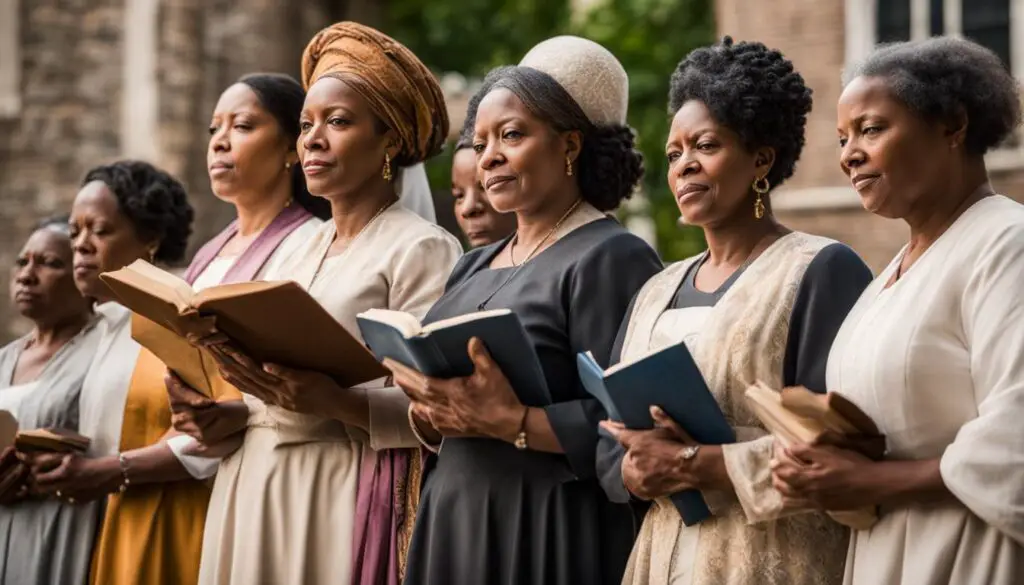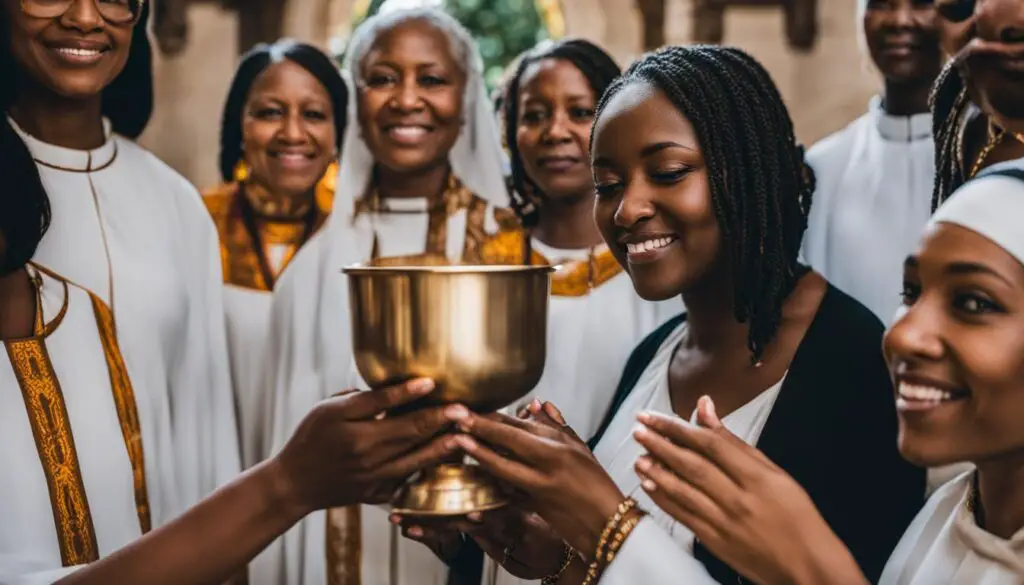Women have played an extraordinary role in shaping the church throughout history, from biblical times to the present day. However, the issue of women’s leadership in the church still remains a point of contention in some religious communities. Outdated beliefs and attitudes continue to limit women’s involvement in church leadership positions, hindering their ability to fully contribute to the faith and the community.
It is crucial to recognize the significant contributions women have made and continue to make to the church. From the early beginnings of Christianity, women have been integral to the growth and development of the faith. They have served as spiritual leaders, role models, and advocates for justice and equality.
This article explores the multifaceted aspects of women in church life, including their historical origins, beliefs and doctrines surrounding their roles, participation in sacraments and rituals, opportunities for leadership and clergy positions, practices in worship, interpretation of sacred texts, denominations with specific women’s ministries, community engagement and outreach, architectural and artistic representations, as well as contemporary issues and challenges they face.
Key Takeaways:
- Women have played a significant role in the church throughout history.
- Beliefs and doctrines regarding women in the church vary among different denominations.
- Women actively participate in worship practices and rituals.
- Opportunities for leadership and clergy positions for women in the church vary.
- Women engage in community outreach and social justice initiatives.
History and Origins of Women in the Church
Women have played a vital role in the church since its earliest days, contributing to the rich tapestry of Church history. In both the Old and New Testaments, women were instrumental in shaping the narrative of faith and exemplified extraordinary faithfulness and resilience.
The Old Testament: In the Old Testament, we find exemplary women who demonstrated remarkable courage and leadership, leaving an indelible mark on religious history. Women such as Deborah, known for her wisdom and prophetic guidance, played a crucial role in the deliverance of the Israelites. Judith, a strategic thinker and brave heroine, triumphed over her enemies against all odds. Esther, chosen by God for a divine purpose, courageously spoke out for her people and saved them from destruction.
The New Testament: In the New Testament, Jesus himself shattered societal norms and empowered women, treating them as equals in a time when they were often marginalized. He engaged in deep conversations with women like the Samaritan woman at the well, honoring their dignity and affirming their significance. Jesus also surrounded himself with female disciples, such as Mary Magdalene, who played a pivotal role in spreading the good news of the resurrection. The early Church continued this legacy, with women serving alongside men and being filled with the Holy Spirit to boldly proclaim the message of the gospel.

Women have been the backbone of the Church throughout history, demonstrating unwavering faith and unwavering dedication. They have left an indelible mark and continue to inspire generations of believers.
| Women of Influence in Church History | Contributions |
|---|---|
| Deborah | Wisdom, prophetic leadership |
| Judith | Courage, strategic thinking |
| Esther | Determination, advocacy for her people |
| Mary Magdalene | Witness to the resurrection, evangelism |
Beliefs and Doctrines Regarding Women in the Church
The beliefs and doctrines surrounding women’s roles in the church are diverse and vary among different denominations and sects. These beliefs are formed based on interpretations of scripture and theological understanding. While some churches uphold traditional views that limit women’s leadership, others embrace a more inclusive perspective that affirms and recognizes women’s spiritual gifts and callings.
“For in Christ Jesus you are all sons of God, through faith. For as many of you as were baptized into Christ have put on Christ. There is neither Jew nor Greek, slave nor free, male nor female, for you are all one in Christ Jesus.” – Galatians 3:26-28
It is important to note that Christianity as a whole encompasses a wide range of beliefs on this issue. Some churches interpret certain biblical passages as indicators of male leadership in the church, leading to the restriction of women in certain roles. Others, however, take a more egalitarian approach, viewing gender as irrelevant in determining one’s ability to fulfill leadership positions within the church.
Sources of Interpretation
Women’s interpretation and understanding of scripture play a significant role in shaping their beliefs and doctrines within the church. Through in-depth study and reflection, women theologians and scholars have contributed to biblical interpretation, shedding light on narratives of women in the Bible and exploring feminist perspectives.
“Wisdom calls aloud in the street, she raises her voice in the public squares; at the head of the noisy streets she cries out, in the gateways of the city she makes her speech.” – Proverbs 1:20-21
These women bring unique insights to the conversation, highlighting the importance of inclusivity, equality, and the empowerment of women within religious institutions.
| Denomination/Sect | Beliefs and Doctrines |
|---|---|
| Roman Catholic Church | Reserves ordained priesthood for men only, affirming the apostolic tradition. |
| Protestant Denominations | Views on women’s roles vary, ranging from full inclusion to varying degrees of restriction on leadership positions. |
| Eastern Orthodox Church | Traditionally restricts women from ordination to the priesthood but allows for diaconal ministries. |
| Anglican Communion | Embraces a range of theological perspectives, allowing individual provinces to decide on the ordination of women. |
These examples illustrate the diversity of beliefs and doctrines regarding women in various religious traditions. They highlight the ongoing conversation and the evolving positions within the church.

While there are disagreements on this issue, many churches recognize the immense value and contributions of women in the church community. They continue to work towards inclusivity, striving to ensure that every individual, regardless of gender, is able to fully participate and utilize their God-given gifts within the body of Christ.
Sacraments and Rituals Involving Women in the Church
Women play a vital role in various sacraments and rituals within the church. These sacred practices are an integral part of their faith journeys, providing opportunities for spiritual growth and connection with God. Let’s explore some of the sacraments and rituals in which women actively participate.
Baptism
Baptism is a significant sacrament in Christianity, symbolizing the initiation into the faith community. Women, like men, receive the sacrament of baptism, marking their commitment to follow Christ and be a part of the church. Through baptism, women are united with the body of believers and enter into a new life in Christ.
The Eucharist (Holy Communion)
The Eucharist, also known as Holy Communion or the Lord’s Supper, is a central sacrament in Christianity. Women, alongside men, partake in this sacred ritual, symbolizing the remembrance of Christ’s sacrifice and His presence in the bread and wine. Through the Eucharist, women experience spiritual nourishment and draw closer to God.
Weddings
Weddings are a joyous celebration of love and commitment in the church. Women take on various roles in weddings, serving as brides, bridesmaids, and witnesses. Their presence and participation symbolize the importance of marriage and support the couple as they enter into a sacred and covenantal union.
Funerals
Funerals are a time to honor and remember the lives of those who have passed away. Women play significant roles in funeral rituals, offering comfort, support, and prayers. They participate in funeral processions, deliver eulogies, and provide emotional support to the grieving families. Through these rituals, women contribute to the healing and solace of the church community.
Women’s active involvement in sacraments and rituals reflects the inclusivity and recognition of their spiritual contributions within the church. These sacred practices provide women with opportunities for personal growth, deepening their relationship with God, and serving their faith communities.

| Sacrament/Ritual | Women’s Participation |
|---|---|
| Baptism | Women, like men, receive the sacrament of baptism, symbolizing their initiation into the faith community. |
| The Eucharist (Holy Communion) | Women actively partake in the Eucharist, experiencing spiritual nourishment and drawing closer to God. |
| Weddings | Women take on various roles in weddings, supporting and witnessing the union of couples in holy matrimony. |
| Funerals | Women play significant roles in funeral rituals, providing comfort, support, and prayers for the grieving families. |
Leadership and Clergy Positions for Women in the Church
The issue of women in church leadership and clergy positions has long been a topic of discussion and debate within religious communities. While some denominations embrace the inclusion of women in these roles, others adhere to more traditional beliefs and interpretations of scripture, limiting their participation. Nonetheless, women have been overcoming barriers and making significant strides in assuming leadership roles within the church.
It is important to acknowledge that the question of women in church leadership is intertwined with differing theological beliefs and scriptural interpretations. While some consider biblical passages to support male-only leadership, others find evidence of women’s active involvement in various leadership positions throughout history.
“The world is now ready for the rising of an army of women whose hearts are large enough to embrace a vision of leadership that is no longer narrowly defined by gender”.
– Oprah Winfrey
Progressive denominations have recognized that spiritual gifts and calling are not bound by gender. They have taken steps to break down traditional barriers and allow women to serve as pastors, ministers, priests, or bishops. This inclusive approach reflects a belief in equality and recognizes the contribution women can make to the church and its community.
In contrast, more traditional denominations may interpret scripture in ways that limit women’s access to leadership positions in the church. These interpretations are often rooted in historical and cultural contexts, which can perpetuate gender inequalities. However, even within these denominations, there have been instances of women defying societal expectations and assuming leadership roles, challenging the status quo.
Examples of Denominations Embracing Women in Church Leadership:
| Denomination | Position | Ordination |
|---|---|---|
| Episcopal Church | Bishop | 1964 (First ordination of a female bishop, Rev. Florence Li Tim-Oi) |
| Evangelical Lutheran Church in America (ELCA) | Pastor | 1970 (First ordination of a female pastor, Rev. Elizabeth Platz) |
| United Church of Christ (UCC) | Minister | 1853 (First ordination of a female minister, Rev. Antoinette Brown Blackwell) |
These examples illustrate the progress made by women in breaking down barriers to leadership positions within certain denominations. The inclusion of women in clergy roles not only provides equal opportunities for women but also enriches the church’s leadership with diverse perspectives and experiences.
Furthermore, women who serve as clergy are often role models for other women and girls within their communities. Their leadership inspires and encourages others to pursue their calling, creating a ripple effect that promotes gender equality and empowerment.
Worship Practices and the Participation of Women
Women play a vital role in worship practices, bringing their voices, talents, and devotion to enhance the spiritual experience of church services. Their active participation in various aspects of worship creates a vibrant and inclusive community.
Women contribute to worship through their musical talents, serving as choir members, praise team members, and instrumentalists. Their voices resonate through the sanctuary, lifting hearts and souls during congregational singing. In leading worship, women bring their unique perspectives and spiritual gifts, guiding the congregation in heartfelt praise and worship.
Prayer is another essential component of worship where women actively participate. They offer intercessory prayers, lifting up the needs of the church, community, and world. Women bring their heartfelt petitions, seeking God’s guidance, comfort, and transformation.
“As women, we have a powerful voice in worship. Our prayers and praises resound through the sanctuary, connecting us with the divine and uniting us as a community.”
Reading scripture is often entrusted to both men and women in church services. Women proclaim God’s word, sharing passages of inspiration, hope, and guidance. Their voices bring life to the sacred texts, reminding the congregation of the timeless truths contained therein.
While women are actively involved in various aspects of worship, it’s important to note that some religious traditions have restrictions on certain roles within worship. For example, in some denominations, the act of preaching or leading sacraments may be reserved for male clergy or leaders. However, women in these traditions still find ways to contribute their talents and devotion to worship.

Sacred Texts and Women’s Interpretation
Women have long played a crucial role in interpreting sacred texts and applying them to their lives and communities. Their unique perspectives and insights bring a valuable contribution to the interpretation of scripture, often shedding light on narratives of women in the Bible and exploring feminist interpretations. Many women scholars and theologians have made significant contributions to biblical studies and theological discourse, enriching our understanding of the texts and challenging traditional interpretations.
One notable example is Elisabeth Schüssler Fiorenza, a prominent feminist theologian known for her work on feminist biblical interpretation. Her groundbreaking book “In Memory of Her,” published in 1983, explores the themes of gender, power, and liberation in the New Testament and examines the role of women in early Christian communities.
“The meaning of scripture is not fixed and unchanging; it is constantly being reinterpreted in light of new insights and perspectives. Women’s interpretation of scripture brings fresh understanding and highlights the voices and experiences of women in the Bible.”
– Elisabeth Schüssler Fiorenza
Through their interpretation of scripture, women strive to promote gender equality, challenge oppressive norms, and advocate for social justice. They pay attention to the stories of marginalized women in the Bible, such as Hagar, Ruth, and the Canaanite woman, seeking to amplify their voices and reclaim their place in religious narratives.
Women’s interpretation of scripture also involves engaging in theological conversations about gender roles, sexuality, and the nature of God. They bring diverse perspectives that contribute to a more inclusive and holistic understanding of the sacred texts.
Women Scholars in Biblical Studies
| Name | Contribution |
|---|---|
| Phyllis Trible | Known for her work on feminist biblical interpretation and her book “Texts of Terror: Literary-Feminist Readings of Biblical Narratives.” |
| Elaine Pagels | Renowned for her scholarship on early Christianity, particularly her book “The Gnostic Gospels.” |
| Mary Daly | A leading figure in feminist theology, she challenged patriarchal constructs in religion and society through her writings. |
These women scholars and many others have opened new avenues of understanding and interpretation, shaping the discourse on gender and spirituality within religious communities and academic circles alike.

Denominations and Sects with Women’s Ministries
Many denominations and religious communities recognize the importance of empowering and supporting women in the church. They have established specific ministries and programs that cater to the unique needs and perspectives of women in leadership roles. These ministries provide resources, training, mentorship, and community for women seeking to make a difference within their religious communities and beyond.
Examples of denominations and sects with women’s ministries include:
- Seventh-day Adventist Church: The Seventh-day Adventist Church has Women’s Ministries, which is dedicated to empowering women to serve their church and community.
- United Methodist Church: The United Methodist Women’s organization is committed to promoting social justice and empowering women through education, advocacy, and outreach initiatives.
- Presbyterian Church (USA): The Presbyterian Women is an organization within the church that provides opportunities for spiritual growth, leadership development, and community service for women.
- Lutheran Church (ELCA): The Evangelical Lutheran Church in America encourages the participation of women in the church through various programs, including Women of the ELCA.
- Episcopal Church: The Episcopal Church acknowledges and supports women’s leadership through organizations such as the Episcopal Church Women, which focuses on fellowship, outreach, and spiritual growth.
These are just a few examples of denominations and sects that have recognized the immense value and contributions women make to the church. By providing platforms, resources, and support, these organizations strive to create an environment where women can thrive and actively participate in church leadership, ministry, and service.
Community Engagement and Outreach by Women in the Church
Women in the church play a pivotal role in fostering community engagement and outreach initiatives. Through their dedication, compassion, and leadership, they make a positive difference in the lives of individuals and communities they serve. Their passion for social justice and commitment to serving others exemplify the teachings of Christ.
Leading by Example
Women actively lead and participate in various community outreach programs, such as feeding programs and clothing drives. They organize and coordinate these initiatives, ensuring that those in need receive essential resources with love and care. Their selflessness and dedication inspire others to get involved and make a meaningful impact.
Advocating for Social Justice
Women in the church are often at the forefront of advocacy and activism for social justice issues. They lend their voices and support to causes that seek to combat inequality, discrimination, and injustice. Through peaceful protests, awareness campaigns, and partnerships with community organizations, they work towards building a more just and inclusive society.
Promoting Compassion
Women’s groups within churches focus on local and global outreach efforts. They actively promote compassion and encourage individuals to extend their love and support beyond the confines of the church walls. These groups organize mission trips, volunteer at local shelters, and engage in acts of kindness that demonstrate God’s love in action.
“It is through our acts of service that we truly reflect the love of Christ. Women in the church inspire and challenge us all to be the hands and feet of Jesus in our communities.”
– Pastor Sarah Thompson
Tables highlighting Women’s Outreach initiatives:
| Initiative | Description | Impact |
|---|---|---|
| Feeding Programs | Regularly providing meals to the homeless and underprivileged | Addresses hunger issues and offers nourishment and hope |
| Clothing Drives | Collecting and distributing clothing to those in need | Provides vital clothing resources and fosters community support |
| Community Service Projects | Engaging in projects that benefit local neighborhoods | Enhances community well-being and strengthens relationships |
| Social Justice Advocacy | Working for equality, human rights, and fairness | Addresses systemic issues and promotes transformative change |
Through their unwavering commitment to serving others, women in the church exemplify the values of compassion, love, and justice. They inspire and empower others to make a difference in their communities and create a more equitable society.
Architectural and Artistic Features Celebrating Women in the Church
Churches have long honored and celebrated women in the faith through their architectural and artistic elements. These visual representations serve as a powerful testament to the important role that women have played and continue to play in the life of the church.
One of the most striking features found in many churches is stained glass windows. These intricately designed windows often depict influential women from the Bible, such as Mary, the mother of Jesus, or Deborah, the prophetess and judge. The colorful glass beautifully captures their stories and serves as a source of inspiration for worshippers.
Sculptures are another form of artistic expression found in churches, representing significant women in religious history. These sculptures can depict religious figures like Saint Clare of Assisi, known for her dedication to poverty and service, or Saint Teresa of Avila, a mystic and writer. Through these sculptures, churches pay tribute to the strength, devotion, and leadership of women.
Paintings and murals also adorn the walls of many churches, displaying scenes and narratives that highlight the contributions women have made. From depicting biblical stories featuring brave and courageous women like Esther or Ruth, to showcasing historical figures who have had a lasting impact on the church, these artistic portrayals serve as a constant reminder of the influential role women have had throughout history.
Together, these architectural and artistic features create a vibrant tapestry, celebrating women’s contributions to the church and inspiring future generations. They serve as a visual representation of the diverse voices and gifts that women bring to the faith community.
“These artistic representations in the church remind us that women have always played a vital role in shaping the faith and should continue to be valued and celebrated in our worship spaces.” – Reverend Jane Thompson
By showcasing the stories and spirits of influential women, churches not only create visually captivating spaces, but they also foster an inclusive and empowering environment. These artistic depictions encourage women to see themselves and their potential within the church, inspiring them to embrace their unique gifts and pursue their callings.
Contemporary Issues and Challenges for Women in the Church
Despite the progress made towards gender equality in various aspects of life, women continue to face challenges in the church. Gender bias, discrimination, and limited opportunities for leadership positions persist in some religious communities. However, there is an ongoing effort to advocate for gender equality and empower women in all aspects of church life.
Many churches are actively addressing these issues and working towards greater inclusivity and gender equality. They recognize the important contributions women make to the church and are committed to creating opportunities for women to serve as leaders and clergy. These churches strive to promote a culture that values and appreciates the diverse gifts and talents that women bring.
While challenges remain, there is hope for a more equitable future. Increasingly, churches are reevaluating their beliefs and doctrines regarding women, embracing inclusive interpretations of sacred texts, and providing platforms for women’s voices to be heard. Through these efforts, the church can become a place where women are supported, empowered, and encouraged to fully participate and lead.
FAQ
What role have women played in the church throughout history?
Women have played a significant role in the church since its early beginnings, with examples of influential women in the Old Testament and New Testament. They have served alongside men and played crucial roles in the salvation history of their communities.
Do all churches have the same beliefs about women’s roles in the church?
No, beliefs and doctrines regarding women’s roles in the church vary among different denominations and sects. Some churches uphold traditional views that limit women’s leadership, while others embrace a more inclusive perspective that affirms women’s spiritual gifts and callings.
How do women participate in sacraments and rituals in the church?
Women participate in various sacraments, including baptism, receiving the Eucharist, and participating in rituals such as infant baptism, weddings, and funerals. The specific roles may vary, but women are actively involved and play important roles in these sacred practices.
Can women hold leadership positions in the church?
The issue of women in church leadership and clergy positions is a topic of ongoing debate and varies among denominations. Some churches allow women to serve as pastors, ministers, priests, or bishops, while others do not, based on differing interpretations of scripture and theological beliefs.
How do women participate in worship practices?
Women actively participate in worship practices, including singing, praying, reading scripture, and leading congregational worship. They may serve as choir members, worship leaders, or liturgists, contributing their voices and talents to enhance the worship experience.
Do women in the church interpret sacred texts differently?
Yes, women bring unique perspectives and insights as they engage with scripture. They often highlight narratives of women in the Bible and explore feminist interpretations, making significant contributions to biblical studies and theological discourse.
Are there specific ministries for women in the church?
Yes, some denominations and religious communities have ministries and programs dedicated to empowering and supporting women in the church. These ministries provide resources, training, and mentorship for women in leadership roles and emphasize the importance of gender equality.
How do women in the church engage in community outreach?
Women in the church play a key role in community engagement and outreach efforts. They lead and participate in initiatives such as feeding programs, clothing drives, community service projects, and advocacy for social justice issues.
How are women celebrated in the church through art and architecture?
Churches often feature artistic elements that honor and celebrate women in the faith. Stained glass windows, sculptures, paintings, and murals depict influential women from the Bible or historical figures who have made significant contributions to the church.
What challenges do women still face in the church?
Despite progress, challenges such as gender bias, discrimination, and limited opportunities for leadership positions persist in some religious communities. Advocacy for gender equality and the empowerment of women in all aspects of church life is an ongoing effort.
















